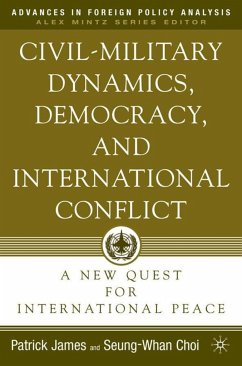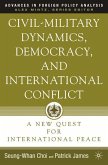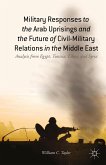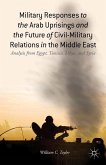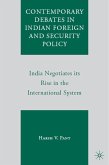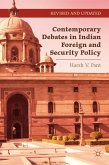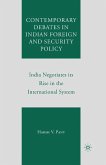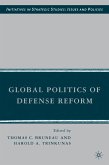Addressing decision-making over interstate disputes and the democratic peace thesis, Choi and James build an interactive foreign policy decision-making model with a special emphasis on civil-military relations, conscription, diplomatic channels and media openness. Each is significant in explaining decisions over dispute involvement. The temporal scope is broad while the geographic scope is global. The result is sophisticated analysis of the causes of conflict and factors that can ameliorate it, and a generalizable approach to the study of foreign relations. The findings that media openness contributes to peaceful resolution of disputes, that the greater the influence of the military the more likely for their to be interstate disputes, that conscription is likely to have the same effect, and that increases in diplomatic interaction correlate with increased conflict are sure to generate debate.
Hinweis: Dieser Artikel kann nur an eine deutsche Lieferadresse ausgeliefert werden.
Hinweis: Dieser Artikel kann nur an eine deutsche Lieferadresse ausgeliefert werden.
"Sound, solid scholarship creatively exploring and extending research on a timely and timeless topic. Must reading for all students of democratic peace theory and its applicability to contemporary diplomatic practice."
- Charles W, Kegley, Pearce Professor of Internartional Relations, University of South Carolina, and President, International Studies Association (1993-1994)
"A New Quest for International Peace carries the democratic peace research program in new and productive directions. Focusing on previously understudied causal mechanisms, the authors find that dyads with low military influence over policy choices and with media that are free to operate without government controls are less likely to become involved in military disputes or suffer high fatalities. Because civil-military relations and media openness are susceptible to influence in a manner that deeper structural factors are not, the findings provide practical policy guidelines to minimize the escalation of interstate conflicts and the results of this research should interest both scholars and policymakers."
- Stephen G. Walker, Arizona State University
"A New Quest for International Peace by Seung-Whan Choi and Patrick James presents a valuable literature review, an original model and provocative ideas that extend and deepen our understanding of one of the pivotal concepts in International Relations, the democratic peace. Their foreign policy decision-making model consists of four crucial factors that have been neglected in explanations of the link between regime type and the propensity to peace/war: civil-military relations, military manpower systems, diplomatic channels and media openness. The model is tested with a sophisticated research design over a long period of international history. As such, the theory and evidence in this book constitute an important contribution to the systematic study of international conflict, crisis and war."
- Michael Brecher, R.B. Angus Professor of Political Science, McGill University
"This an important addition to the literature on the causes of war. It confirms much of the past work on the Kantian or liberal peace, challenges some previous findings, and extends this research in interesting, useful new directions. Perhaps the most important finding is that democracies seem better able to signal their capabilities and intentions and thus avoid the use of force. This important book provide practical guidance for policy makers hoping to shape a more peaceful world." - John R. Oneal, University of Alabama
- Charles W, Kegley, Pearce Professor of Internartional Relations, University of South Carolina, and President, International Studies Association (1993-1994)
"A New Quest for International Peace carries the democratic peace research program in new and productive directions. Focusing on previously understudied causal mechanisms, the authors find that dyads with low military influence over policy choices and with media that are free to operate without government controls are less likely to become involved in military disputes or suffer high fatalities. Because civil-military relations and media openness are susceptible to influence in a manner that deeper structural factors are not, the findings provide practical policy guidelines to minimize the escalation of interstate conflicts and the results of this research should interest both scholars and policymakers."
- Stephen G. Walker, Arizona State University
"A New Quest for International Peace by Seung-Whan Choi and Patrick James presents a valuable literature review, an original model and provocative ideas that extend and deepen our understanding of one of the pivotal concepts in International Relations, the democratic peace. Their foreign policy decision-making model consists of four crucial factors that have been neglected in explanations of the link between regime type and the propensity to peace/war: civil-military relations, military manpower systems, diplomatic channels and media openness. The model is tested with a sophisticated research design over a long period of international history. As such, the theory and evidence in this book constitute an important contribution to the systematic study of international conflict, crisis and war."
- Michael Brecher, R.B. Angus Professor of Political Science, McGill University
"This an important addition to the literature on the causes of war. It confirms much of the past work on the Kantian or liberal peace, challenges some previous findings, and extends this research in interesting, useful new directions. Perhaps the most important finding is that democracies seem better able to signal their capabilities and intentions and thus avoid the use of force. This important book provide practical guidance for policy makers hoping to shape a more peaceful world." - John R. Oneal, University of Alabama

